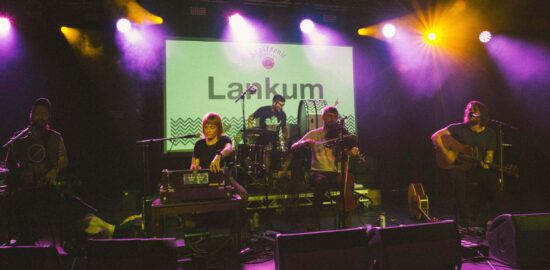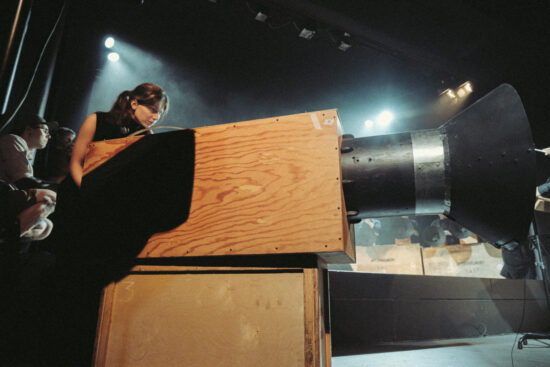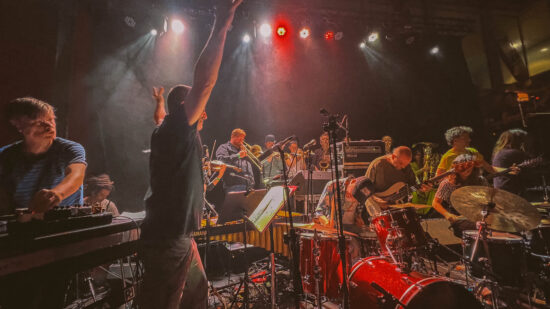From the lessons of deep listening by Meredith Monk and Ryoji Ikeda, through meditations by Tarta Relena and FUJI|||||||||||TA, the psychedelic journeys of Jameszoo’s Blind Group and Flock, to back to the future with Robert Henke’s Commodores – this year’s Rewire showcased many facets of the contemporary music world that offers different narratives of reality.
>>> Full gallery on FLICKR <<<
As the crowd settles into their seats, a growing, resonating sound begins to come from the stage. The percussive drone from the crash cymbals is created by rubbing rubber-headed sticks across their surface and gently rotating them. There are 100 cymbals – 10 people make mathematical transitions among them. They play uniformly, creating a reverberating shell that travels across the Amare concert hall. At one point, everyone on the stage is holding two timpani sticks: first they hit two neighbouring cymbals with a resonating thud, then they switch to traditional sticks and hit the top of the percussion. Shimmering spasmodic strokes intervene in the monotonous background, until at the end they make the sound literally fly across the room. Suddenly and unexpectedly, everything disappears. Ryoji Ikeda’s mantric composition performed by Les Percussions de Strasbourg makes the excellent use of the venue’s acoustics. It resonates in ears and takes us away from the humming of the crowd to put us in a meditative state.
A few hours later, a similar effect is created by Cellular Songs by Meredith Monk and Vocal Ensemble. It is a frugal, almost austere concert, created in accordance with the old school of avant-garde. She builds a multithreaded story with the polyphonic vocals complemented by performative dance acrobatics. Gradually, the sounds of violin and piano appear, but only as an addition. Monk and her band sing and build the narrative sparingly. They play with silence, they don’t rush anything, the drama assumes the form of a performance that goes beyond the concert framework. The composer is precise and meticulous. The abstract vocals give way to the text only for the moment when she sings “Happy Woman”, a song about the various facets of femininity. It was an eloquent, poignant concert.

Meredith Monk 
Flock
>>> Full gallery on FLICKR <<<
I like Monk’s minimalism best – when she performed Memory Game the following day with Bang on a Can All-Stars, there was too much of everything. Austerity was replaced by the sumptuousness of dense ensemble compositions, and the scarceness of gestures was overshadowed by the overly elaborate ensemble choreography. Monk draws from simplicity and is the best at inducing a trance of suspension and stretching time, which was proven brilliantly in Cellular Songs.
This moment of duration, of building a story, was portrayed wonderfully during the FUJI|||||||||||TA’s concert in a gloomy Korso hall. The organ built specifically for his needs, which he filled with self-pumped air throughout the concert, was inspired by the classical Japanese gakagu music. The musician brilliantly built up the drama – starting with a loop of squeaky sounds, then generating drone-like, multi-layered shells. For the finale, he fleshed out these measures, adding vocal murmurs and shouts. The meditative piece felt like a deep listening test, but at the same time it amazed the audience with the musician’s real work: constant twisting of knobs, changing frequencies, and supervising the sound on the console, and also with a brilliantly constructed narrative. A truly exceptional experience.
Rewire’s programme was extensive, the artists I decided to see balanced between meditation and frenetic improvisation or exuberance. For the second time in six months I saw the duo Tarta Relena, once again in a church (they played in the Lutherse Kerk). The Catalans did a great job with dramatizing their journey back in time. They sung Mediterranean poems in polyphony with electronic elements. Sacred songs were sometimes rhythmized or lined with beats. It worked perfectly again.

FUJI|||||||||||TA
However, I attended two concerts that mixed electronics and violin sounds and they didn’t really appeal to me. The studio material of the duo -__-___ that consists of More Eaze and Seth Graham or Jeremiah Chiu & Marta Sofia Honer, was a bit boring live. These gigs lacked the idea of how to translate the material into the language of a concert. No dramaturgy, pointless use of autotune, sometimes too much of improvisation. The same with Grouper – her oneiric concert was too long with no turning points. In contrast, the hermetic, nuanced in sound details album music by Jameszoo’s Blind Group, during the show transformed into a booming, rushing amalgam on sounds, consisting of the sounds of synthesizer, piano, bass and drums.
One of the best moments of Rewire was the gig of Bitchin Bajas. The starting point of it was their last year’s cassette Switched on Ra – they sound sour and dark bathed in psychedelic lighting and smoke. I got sucked in by the upbeat and trance-like songs, including when Dan Quinlivan reached for the microphone to sing. The trio created a set combining bits, sound collages and krautrock flair made with synthesizers (I like a “woodwind” model used by Robert Frye). Everything was full of detail, synth polyphonies and electronic haze; a kind of a trance BBC Radiophonic Workshop on acid.

Bitchin Bajas
>>> Full gallery on FLICKR <<<
The Bitchin Bajas played in the Koorenhuis – apart from them, jazz artists are the most frequent guests here. The best performance was given by Flock, a debuting British band that played their very first gig. The percussion sounds by Sarathy Korwar and Bex Burch were perfectly complemented by the keyboard passages by Al MacSween and Danalogue. The latter let himself be carried away with impressionistic, minimalist looping, but also with dense bass synth interludes. The most memorable, however, was Tamara Osborn, who reached for a flute and saxophones, perfectly nuancing the music. It was the best when she played on the baritone saxophone: it created a prolonged and powerful drone, an important element of Flock’s music.
Jaimie Branch with her quartet managed to create a sensational, rocking story: from dense grooves, to frenetic, improvised forms and song-like moments, accompanied by a chorus of her bandmates. Alabaster DePlume performed in the venue with the Flock members mostly the music from his brand new Gold album. It was very psychedelic, sometimes even trance-like. A powerful moment happened during the song entitled “I Was Gonna Fight Fascism”, especially when – after enumerating the reasons for not getting involved – he sang the meaningful quote: “I was gonna fight fascism / But it was too late”. It was very up-to-date: although none of the artists I saw at the festival referred directly to the war in Ukraine, that moment was a universal reminder that we need to react in time.

Jaimie Branch Fly or Die 
Robert Henke
The icing on the cake of the festival was Robert Henke, who joined the event at the very last moment to present a wonderful programme CBM 8032 AV, inspired by Commodore computers. Five huge machines on the stage and the German composer dressed like a lecturer at a university of technology looked pretty abstract in the beautiful hall of Koninklijke Schouwburg. However, the simple and minimalist music combined with the visuals was really engaging, and preserved its timelessness. Henke not only enjoyed playing it, but he also gave it a powerful dramaturgy: from gritty drone tensions to techno structures.
It was a great culmination of the Rewire, which for me started with a deep listening lesson, meditation and psychedelic travels, and ended with a kind of a trip back 40 years in time. The Hague festival showed how music can create different narratives of reality – whether it’s minimalism in the Amare concert hall or pulsating techno in the 18th-century theatre under Henricus Jansen’s vault paintings.




